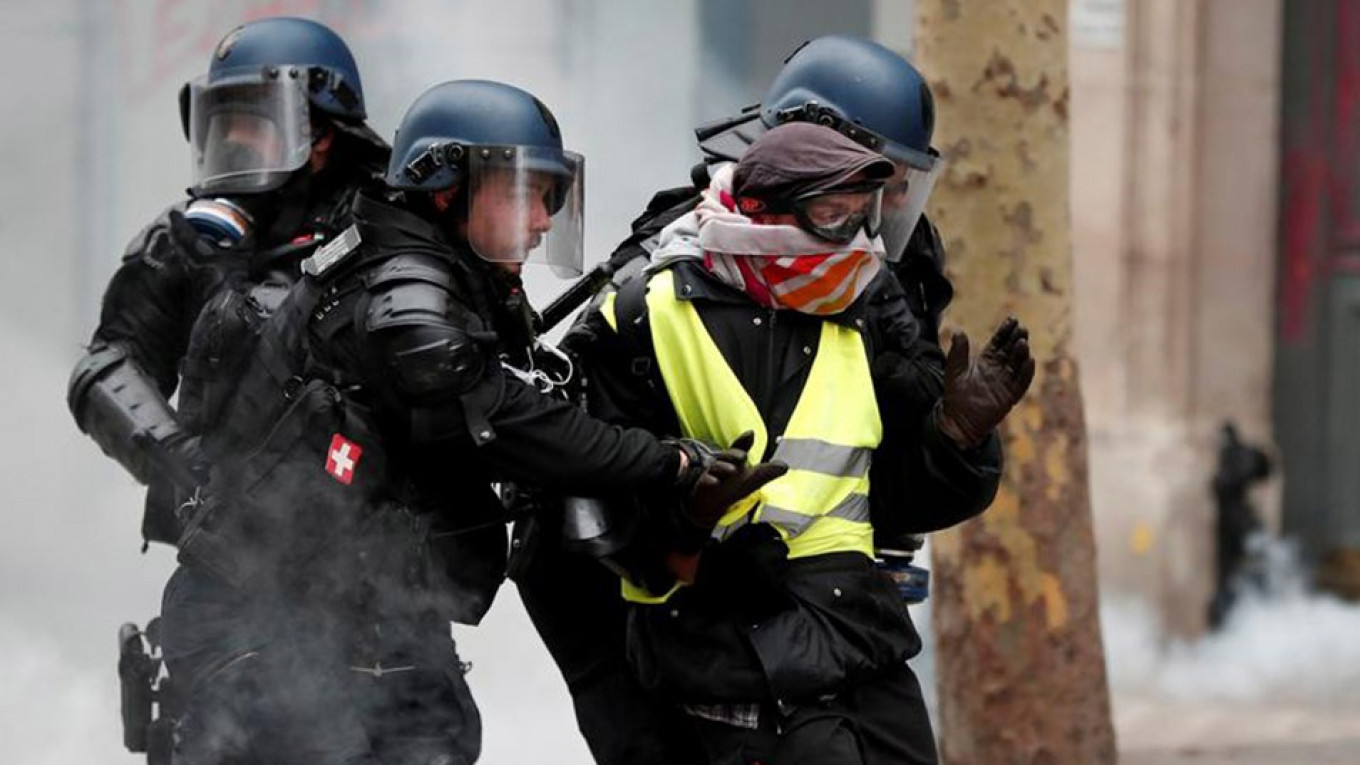France opened a probe into possible Russian interference behind the country’s Yellow Vest protests, after reports that social-media accounts linked to Moscow have increasingly targeted the movement.
According to the Alliance for Securing Democracy, about 600 Twitter accounts known to promote Kremlin views have begun focusing on France, boosting their use of the hashtag #giletsjaunes, the French name for the Yellow Vest movement. French security services are looking at the situation, Foreign Minister Jean-Yves Le Drian said Sunday in a radio interview with RTL.
Russia has been criticized for using social media to influence elections in the U.S. and elsewhere. Attempts to use fake news reports and cyberattacks to undercut the 2017 campaign of French President Emmanuel Macron failed, but Russian-linked sites have pushed questionable reports of a mutiny among police, and of officers’ support for the protests.
“An investigation is now underway,” Le Drian said. “I will not make comments before the investigation has brought conclusions.”
The Twitter accounts monitored by the alliance usually feature U.S. or British news. But the French protests “have been at or near the top” of their activity for at least a week, according to Bret Schafer, the alliance’s Washington-based social media analyst. “That’s a pretty strong indication that there is interest in amplifying the conflict” for audiences outside France.
The Alliance for Securing Democracy is a unit of the German Marshall Fund of the U.S., which monitors pro-Kremlin activity.
The assertion of police dissatisfaction — which doesn’t appear to be supported by facts — resembles other Kremlin-backed disinformation campaigns that have tried to engender mistrust in Western governments and show that liberal democracies are in decline, Schafer says.
Russian state media
Much of the tweeted material comes from Russian state media outlets including the Sputnik news website, the RT television network, and Ruptly, a German-based video news agency that belongs to RT. These outlets are covering the French crisis closely; RT has said that 12 of its journalists have been injured in the protests, far more than any other news organization.
Sputnik and RT have reported in recent days that most French police no longer support Macron and are siding with the protesters. Their sources: representatives of two small police unions that together won less than 4 percent of votes in nationwide union elections this month. Sputnik and RT also have shown a video – widely shared on French social media — of police in the southwestern town of Pau removing their helmets in what was described as a sign of solidarity with protesters. Local police and journalists on the scene said the description was untrue. They said some officers had briefly removed their helmets to talk with protesters before putting them back on.
In response to questions from Bloomberg News, Sputnik later corrected its article about police in Pau showing solidarity with protesters, to say the report "hasn’t been backed by evidence so far." RT said its article about police siding with protesters, based on comments by the head of a minor police union, was justified because he had been quoted by other news outlets.
Macron complained repeatedly during his 2017 campaign that Kremlin-controlled media outlets were spreading fake news about him, because he took a tougher stance on Russia than his chief rivals, Marine Le Pen of the far-right National Front and François Fillon of the conservative Republicans. But negative stories, such as a Sputnik report claiming Macron lived a “double life” and was backed by a “wealthy gay lobby,” never gained traction.
In one instance, a bogus website resembling the site of a Belgian newspaper reported that Macron’s campaign was being bankrolled by Saudi Arabia. The source of the hoax was never determined, but the European Union’s East Stratcom Task Force, which tracks Russian disinformation efforts, said it bore striking similarities to an earlier incident traced to a Russian “troll factory.”
Separately, the Macron campaign was hit with repeated email phishing attacks resembling those used by Russia against Democratic Party organizations in the U.S. The Kremlin said it had no involvement in any fake news or cyber attacks on Macron, describing such accusations as “slander.”
A Message from The Moscow Times:
Dear readers,
We are facing unprecedented challenges. Russia's Prosecutor General's Office has designated The Moscow Times as an "undesirable" organization, criminalizing our work and putting our staff at risk of prosecution. This follows our earlier unjust labeling as a "foreign agent."
These actions are direct attempts to silence independent journalism in Russia. The authorities claim our work "discredits the decisions of the Russian leadership." We see things differently: we strive to provide accurate, unbiased reporting on Russia.
We, the journalists of The Moscow Times, refuse to be silenced. But to continue our work, we need your help.
Your support, no matter how small, makes a world of difference. If you can, please support us monthly starting from just $2. It's quick to set up, and every contribution makes a significant impact.
By supporting The Moscow Times, you're defending open, independent journalism in the face of repression. Thank you for standing with us.
Remind me later.






